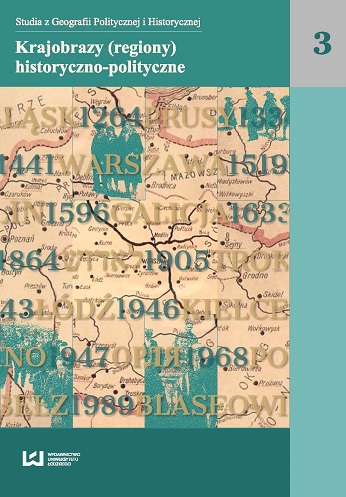Udział Polaków w formowaniu południowoafrykańskiej Kolonii Przylądkowej
DOI:
https://doi.org/10.18778/2300-0562.03.11Słowa kluczowe:
Afryka Południowa, Polacy, Kolonia Przylądkowa, kolonizacja holenderska, kolonizacja brytyjskaAbstrakt
Udział Polaków w kolonizowaniu i zagospodarowywaniu Kolonii Przylądkowej nie jest powszechnie znany. Tymczasem Polacy pojawiali się w niej od samego początku jej istnienia (1652 r.). Przez prawie cały badany okres obecność ta była wynikiem silnych więzów gospodarczych wiążących Polskę z Niderlandami. Pod koniec tego okresu nastąpił wzrost ich udziału w związku z obecnością w Kolonii licznych obcych jednostek wojskowych, w których służyli Polacy. Wielu przybyszów z Polski osiedliło się w Południowej Afryce na stałe, założyło rodziny, a ich potomstwo weszło w skład miejscowego społeczeństwa. Pod panowaniem brytyjskim, w wyniku dwóch fal kolonizacji, osiedlili się kolejni przybysze z Polski, niejednokrotnie przybywając całymi rodzinami. Świadectwem tego zjawiska są dzisiejsze rodziny afrykanerskie: Ankiewicz, Aproskie, Beirowski, Drotsky, Hohowsky, Jankowitz, Jewaskiewitz, Kitshoff, Kolesky, Latsky, Masuriek, Troskie, Waberski, Zowitsky itd. Pobieżne obliczenia wskazują, że osadnicy z Polski stanowili nieco ponad 1% przodków dzisiejszych Afrykanerów. Polacy brali również udział w pionierskich przedsięwzięciach na odległych pograniczach Kolonii, w tym w wyprawie łupieżczo-handlowej z 1702 r.
Bibliografia
Ankiewicz L., 1992, Genealogie Ankiewicz, „Familia. Quarterly Journal of the Genealogical Society of South Africa”, 29 (2), s. 37–40.
Google Scholar
Barnard A.L., 1901, South Africa a century ago. Letters written from the Cape of Good Hope (1797–1801), Smith, Elder, & Co., London; Dodd, Mead & Co., New York.
Google Scholar
Barrow J., 1801, Travels into the interior of Southern Africa in the years 1797 and 1798, Printed by A. Strahan, Printers-Street, London.
Google Scholar
Coertzen P., Fensham F.C., 1988, The Huguenots of South Africa, 1688–1988, Huguenot Society of South Africa, Cape Town.
Google Scholar
Gelder van R., 1997, Het Oost-Indisch avontuur. Duitsers in dienst van de voc (1600–1800), Socialistiese Uitgeverij Nijmegen, Nijmegen.
Google Scholar
Gelder van R., 2003, Naporra’s omweg: het leven van een VOC-matroos (1731–1793), Atlas, Amsterdam.
Google Scholar
Greeff J.M., 2007, Deconstructing Jaco: Genetic heritage of an Afrikaner, „Annals of Human Genetics”, 71 (5), s. 674–688.
Google Scholar
DOI: https://doi.org/10.1111/j.1469-1809.2007.00363.x
Heese J.A., 1971, Die Herkoms van die Afrikaner 1657–1867, A.A. Balkema, Cape Town.
Google Scholar
Höge J., 1946, Personalia of the Germans at the Cape, 1652–1806, Archives Yearbook for South African History, Archives Yearbook, Pretoria.
Google Scholar
Koch J., 2012, J.M. Coetzee in Poland. Introduction, „Werkvinkel”, 7 (2), s. 9–11.
Google Scholar
Kowalski M., 2006, Polish Boer families, „Familia. Quarterly Journal of the Genealogical Society of South Africa”, 43 (2), s. 38–46.
Google Scholar
Kowalski M., 2009, Polish soldier-immigrants to South Africa in the period of French Revolution and the Napoleonic wars (1789–1815), „Familia. Quarterly Journal of the Genealogical Society of South Africa”, 46 (3), s. 147–164.
Google Scholar
Kowalski M., 2012, Imigranci z Rzeczpospolitej Obojga Narodów w początkowej fazie europejskiego osadnictwa w Kolonii Przylądkowej, „Przegląd Geograficzny”, 84 (2), s. 279–312.
Google Scholar
DOI: https://doi.org/10.7163/PrzG.2012.2.6
Kowalski M., 2013, Immigrants from the Polish-Lithuanian Commonwealth in the early stages of European colonization of the Cape Colony, „Geographia Polonica”, 85 (3), s. 55–76.
Google Scholar
DOI: https://doi.org/10.7163/GPol.2012.3.18
Kowalski M., 2014, Poles in the Dutch Cape Colony 1652–1814, „Werkvinkel” (w druku).Polish settlers in South Africa (1652–1910), Geni.com: https://www.geni.com/projects/Polish-settlers-in-South-Africa-1652-1910/15941
Google Scholar
Rensburg van A.M., 1999, Jan Latsky a Centurion, „Familia. Quarterly Journal of the Genealogical Society of South Africa”, 36 (4). s. 149.
Google Scholar
Shell R.C.-H., 2005, The forgotten factor in Cape Colonial frontier expansion, 1658–1817, „Safundi. The Journal of South African and American Comparative Studies)”, 6 (2), s. 1–38.
Google Scholar
Villiers de S.A., 1971, Robben Island: Out of reach, out of mind: A history of Robben Island, C. Struik, Cape Town.
Google Scholar
VOC, Scheepssoldijboeken van de Verenigde Oost-Indische Compagnie, Nationaal Archief: http://vocopvarenden.nationaalarchief.nl/ (21.05.2014).
Google Scholar
Zaradniak M., 2012, John Maxwell Coetzee: „Pisarz to po prostu zawód”. Spotkanie z doktorem honoris causa UAM, „Głos Wielkopolski, 9 lipca 2012: http://www.gloswielkopolski.pl/artykul/614593,john-maxwell-coetzee-pisarz-to-po-prostu-zawod-spotkanie-z-doktorem-honoris-causa-uam,id,t.html
Google Scholar
Żukowski A., 1994, W kraju złota i diamentów. Polacy w Południowej Afryce XVI–XX w., Wydawnictwo Naukowe PWN, Warszawa.
Google Scholar
Żukowski A., 2001, Udział Polaków w formacjach wojskowych i porządkowych w Afryce Południowej na przestrzeni wieków; [w:] Judyccy A. i Z. (red.), Polacy i osoby polskiego pochodzenia w siłach zbrojnych i policji państw obcych. Historia i współczesność”. Materiały VI Międzynarodowego Sympozjum Biografistyki Polonijnej, Instytut Badań Biograficznych, Toruń, s. 584–593.
Google Scholar
Żukowski A., 2005, Servicemen from the Kingdom of Poland in the Dutch East India Company and their South African connections, „Slavic Almanach. The South African Journal for Slavic, Central and Eastern European Studies”, 11 (1), s. 96–106.
Google Scholar
Pobrania
Opublikowane
Jak cytować
Numer
Dział
Licencja

Utwór dostępny jest na licencji Creative Commons Uznanie autorstwa – Użycie niekomercyjne – Bez utworów zależnych 4.0 Międzynarodowe.








